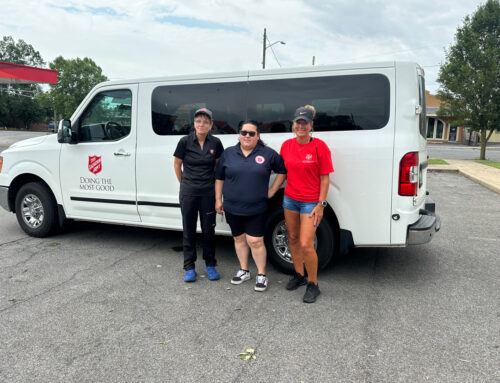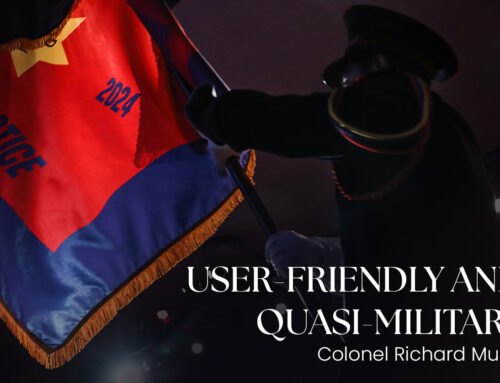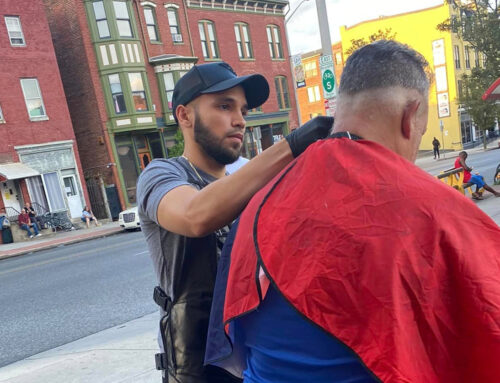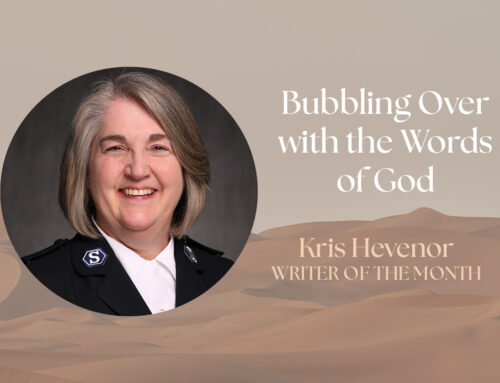Report from Poland
by Robert Myers III


Report from Poland
by Robert Myers III
May 3, 2022—It has been just over two weeks since I arrived here in Poland, and it has been a bit of a marathon already. The Army presence here is quite small with only four corps. They’re spread out across the country. Our mission here has been to support the in–country operations and to continue to move items into Ukraine, through one of the only open corridors—the Ukrainian city of Lviv. Most of our administrative work is done from the Regional Headquarters. It’s essentially a divisional office, but small and located in a converted apartment in Warsaw.
In our direct support of Ukraine, we coordinate the shipping of goods into Lviv. Every week, we ship maximum quantities in chunks from our inventory. We’re doing this in cooperation with the divisional leaders for Ukraine, the corps officer in Lviv, and our partners at UPS. They’ve donated a warehouse space for us just outside of Warsaw, which serves as the central point and staging area for us.
Shipping is a challenge due to the normal customs and paperwork requirements, combined with the everchanging restrictions on items coming into Ukraine. In addition, we must sync our deliveries with the corps officer from Vinnytsia who takes supplies back for his corps as well as corps in Kopnyc and Dnipro, which is the corps furthest to the east that still provides services. It is a bit of a dance to move what we would consider small loads (6–10 pallets) into the country at what is a heavy lift. Nonetheless, we are getting essential items into the hands of people who need them.
Crossing multiple borders
Another unique aspect of the problem is that Poland and Lithuania are part of the Germany Territory. This means that some of the support and coordination must happen through Territorial Headquarters in Cologne, Germany. We have been working with them to procure equipment for Ukraine in the form of generators, tents, portable stoves, and heaters, so the corps in Ukraine can provide hot meals in some of the hardest hit communities.
Although nearly three weeks into the process, we are finally able to get in the first batch of equipment. As you can imagine, having a third country involved makes the already challenging logistics even more complicated. This, combined with the least common items being shipped, means we are having to jump through more hoops to ensure the items arrive at their final destinations. Customs agents in Ukraine confiscated one load that had to be sorted on the Ukrainian side, so now we are careful to make sure everything is in order.
Since arriving in Poland, we have visited all four corps. The largest of the corps and easiest to access is in Warsaw in the Praga neighborhood. The corps there is small, but the leaders run two separate facilities. The main corps and about two blocks (only 2 rooms; one larger multi–purpose and a small kitchen room). The second facility is a larger three–room store front known as the Family Center.
Reaching needy families
This is essentially an outreach facility from which they are providing their support to refugees. They meet with 30–60 families per day, scheduled in advance, and provide gift cards, in–kind food and hygiene items, and a small selection of donated clothing. Although they have scaled down appointments to only 3 days per week, they remain active.
Our first outside visit was to Rzeszow, the corps furthest south. Travel is not difficult, but it is time consuming. It took almost 5 hours each way by train to get there. It is also the closest to the border. As the fastest growing city in Poland, it has a population of 250,000 people. Since the influx of Ukrainians into the country, the population has more than doubled to 600,000. The corps is supporting several shelters with physical food stocks on a weekly basis and is providing gift cards.
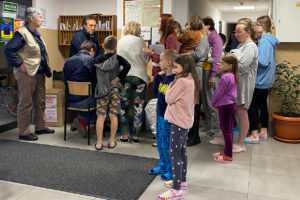
Many places have become shelters, including a local university that made vacant dorms available, and an office headquarters that turned entire floors into shelters. Their employees have been working remotely since the pandemic. Although much attention is given to the border crossing, the bulk of the work is not there. Once people go through the process and cross into Poland, many board buses or trains, so the vast majority of work is in the receiving cities, of which Rzeszow is one of the largest and is often the first stop.
Our next visit was to a small town called Malbork. This city is known for being home to one of the largest castles in the world. It is so massive; it can be seen from aanywhere in town. The city is also where the corps is located furthest to the north. The officers there are fantastic people who have supported refugees being assisted by host families, which is happening all over Poland. Some 700 to 1,000 people in this town of 20,000 are being assisted by The Salvation Army with gift cards, in–kind goods or purchased food supplies. The Army is prominent in the city and has a strong network that has allowed it to assist in a significant way.
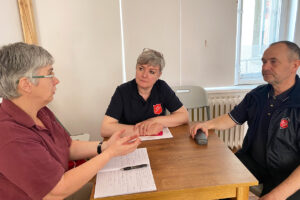
Our last stop yesterday was to the southern city of Starachowice (pronounced staratovychie). The corps is the only property owned by The Salvation Army in Poland. It is also the largest. The main building has a couple of large rooms, a full–sized commercial kitchen, and a lovely garden and grounds. Next door, the corps runs a European Union (EU) government supported food pantry in a separate, one–room building. The corps leaders have offered gift cards and distributed food and in–kind goods. The single, retired officer here is doing amazing work on her own with a few key volunteers.
Food, clothes, and gift cards
We are currently preparing to offer the next round of gift cards. In addition to the Lidle grocery store cards from the first phase, we are planning to offer larger value cards for use at clothing stores as well in this second phase. Many of the refugees evacuated during the winter. Now that the weather is changing, they don’t have the appropriate clothing. We will also provide additional food support for corps here in Poland as well as the ongoing support to the Ukraine corps.
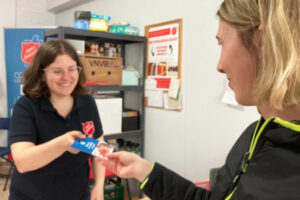
The biggest aspect of our next round will be to provide staff at each center, as well as vehicle and storefront storage space rentals. Most of the facilities are small, rented spaces and do not have the space to adequately support the ongoing work. This project will allow them to hire staff, look for temporary space, and meet the needs of their communities.
It is challenging, as even little things take significant work to accomplish, but the people who work on the Army’s behalf have been amazing. Nothing that our small team of two have done would be possible if not for the dedicated local officers and personnel here in Poland and in Ukraine. It will be a long road ahead for Ukraine, but what little bit we can do in support will help ease these unfortunate circumstances.
Robert Myers III is the Emergency Disaster Services coordinator for The Salvation Army USA Eastern Territory.

